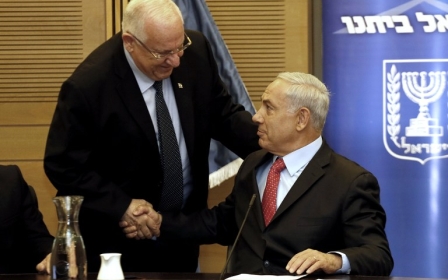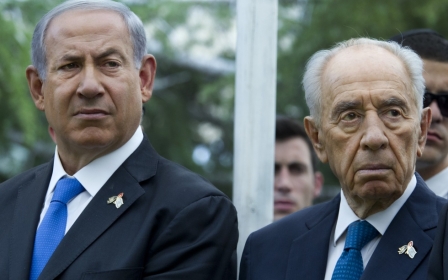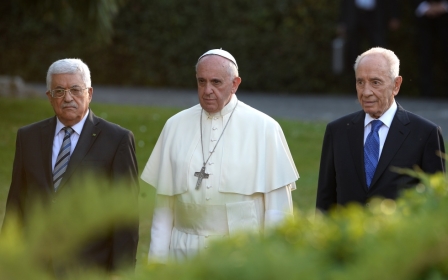Israel parliament elects country's 10th president

Israel's parliament will elect the country's 10th head of state on Tuesday, choosing between five candidates hoping to replace Shimon Peres whose presidential term in office ends in July.
None of the five comes even close to the stature of Peres, whose charisma and popularity enabled him to transcend the largely ceremonial position of the presidency.
Members of Israel's 120-seat Knesset, or parliament, will gather at 11:00 am (0800 GMT) for a special session of the plenum at which they will begin voting to choose a successor to Peres, whose last day in office is July 27.
With none of the five expected to garner the 61 votes required to win outright, there is likely to be a run-off which will be held during the afternoon with final results expected by the evening.
The last surviving member of Israel's founding fathers, Peres has spent seven years serving as Israel's head of state and is still going strong with his term in office due to end just a week shy of his 91st birthday.
He enjoys huge popularity among Israelis, with a Channel 2 television poll finding that nearly two thirds of the public had wanted him to remain in his post.
Peres' departure from office is likely to switch the presidency's focus from international affairs to more domestic matters, commentators say.
So far, all the candidates have played the card of "national unity", pledging to respect the essentially apolitical nature of the role, which was so elegantly avoided by Peres.
Peres's open engagement with the question of the Israeli-Palestinian conflict often put him on a direct collision course with Netanyahu, and he also spoke out about Israel's often tense relations with Washington and on the Iranian nuclear threat.
For many, he will be remembered for restoring the reputation of the Israeli presidency, which was badly tarnished by former incumbent Moshe Katsav who was convicted on two counts of rape and other sexual offences.
Israel's five presidential hopefuls
The five candidates competing in the race to elect Israel's 10th president on Tuesday are:
Reuven Rivlin
A Likud MP and two-time former parliament speaker, Rivlin is seen as having the most support among the Knesset's 120 MPs.
A rightwing hawk with a quirky sense of humour, Rivlin is known for his fierce defence of democracy and human rights, which has earned him respect from the left as well as from Israel's Arab minority.
The affable Jerusalem-born 74-year-old lawyer was first elected to parliament in 1988 and stood for president in 2007, losing to Peres.
Meir Sheetrit
An emigrant from Morocco, Sheetrit entered parliament as a member of Likud in 1981, and now stands for the centrist HaTnuah faction.
The 65-year-old began his political career in 1974 as mayor of the poor southern town of Yavne, earning himself the image of a modest "man of the people".
"If someone had told me 50 years ago as a child in Morocco that one day I would be a cabinet minister, an MP and a candidate for president... I would have said he was dreaming," he has said.
Dalia Itzik
Itzik, 61, became the first woman speaker of the Knesset in 2006 and is hoping to become Israel's first female president.
Born in Jerusalem to a family of Iraqi origin, she spent two decades in politics before stepping down to take a break shortly before the elections of 2013.
She briefly served as acting president when incumbent Moshe Katzav took a three-month leave of absence in 2007 to fight allegations of sex crimes for which he was eventually convicted.
Dalia Dorner
Aged 80, Dorner is a retired Supreme Court justice who is also hoping to become Israel's first female head of state.
Born in Turkey in 1934, she is a political outsider whose views are largely unknown, but who has a reputation for speaking out for democracy and human rights, particularly during her time at the Supreme Court when she penned several key rulings on civil rights.
Dan Shechtman
Born in Tel Aviv in 1941, Shechtman, 73, is best known for winning the 2011 Nobel Chemistry Prize for his discovery of quasicrystals.
A professor at the prestigious Technion Institute of Technology in the northern city of Haifa, he has no political experience. But a poll published at the end of May showed he was the public's second favourite candidate for president, after Rivlin.
New MEE newsletter: Jerusalem Dispatch
Sign up to get the latest insights and analysis on Israel-Palestine, alongside Turkey Unpacked and other MEE newsletters
Middle East Eye delivers independent and unrivalled coverage and analysis of the Middle East, North Africa and beyond. To learn more about republishing this content and the associated fees, please fill out this form. More about MEE can be found here.




